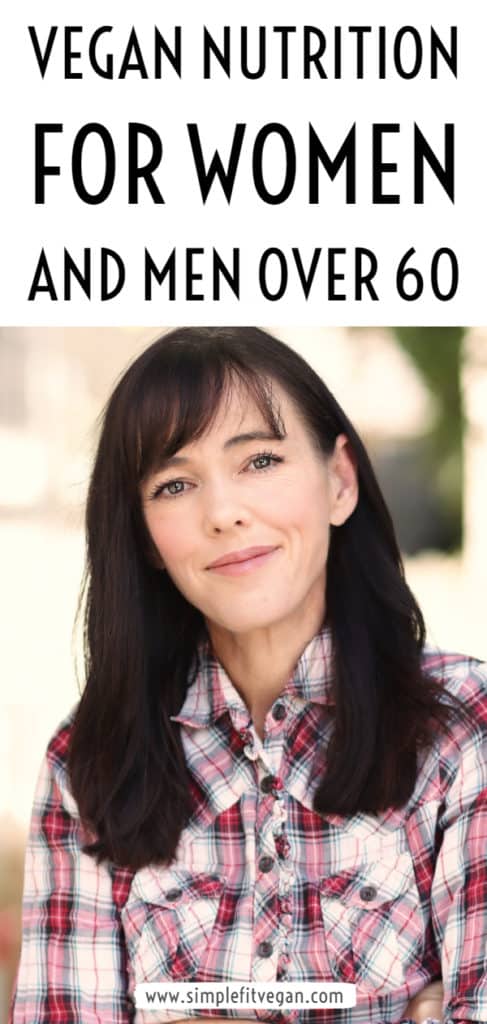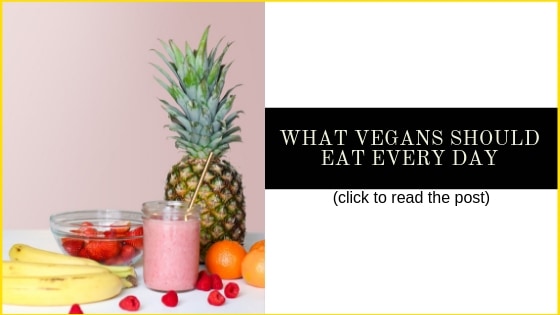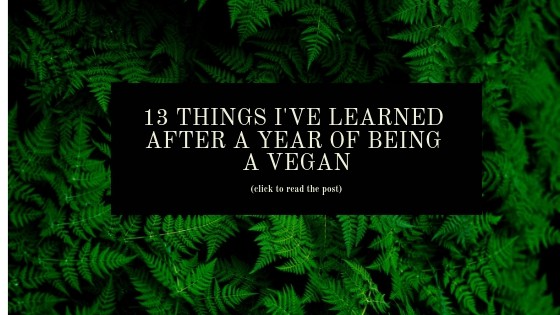My brand new cookbook is out on Amazon! It’s called “30-Minute Plant-Based Recipes” and it’s perfect for busy vegans. Grab it now!

In today’s post, I will lay out the most common vitamin deficiencies for adults over 60 years old (for both women and men) and what to do to ensure you’re getting enough nutrients.
While researching, I found an interesting statistic – an increasing number of baby boomers (adults over 55 years old) are going vegan, predominantly for health and ethical reasons.
My post on 5 Ultimate Vitamins and Minerals for Great Vegan Health gives a good foundation that is applicable to all vegans. However, senior vegans have slightly different nutrient needs to due to aging. One is that seniors require fewer calories primarily due to reduces muscle mass and decreased physical activity. At the same time, they need more protein and vitamins and minerals to support healthy lives.
Protein
To support muscle mass, it’s recommended to eat at least 1 g of protein per kg of body weight (this equates to 0.45g per 1 lbs of body weight). Let’s say if you weigh 120 lbs you should consume 54 g of protein every day.
Beware of consuming too much protein as this can accelerate the decline in kidney function.
Some examples of protein rich plant foods are tofu, tempeh, edamame, peanut butter, lentils, quinoa, and oats.
Iron and Zinc
For men, daily suggested iron intake stays unchanged at 8 mg. For women, however, iron needs change later in life after menopause. Daily intake for women should be at 14.4 mg.
Beans, lentils, pumpkin seeds, chickpeas, dried apricots are high in iron. To give you an idea, a 1/2 cup of cooked beans has about 2.1 mg of iron. Sometimes, it could be difficult to eat enough foods that are high in iron. Therefore, it’s a good idea to incorporate fortified cereal or enriched pasta to daily meals.
Iron present in plant foods is absorbed by the body at a slower rate compared to meat. Consuming vitamin C rich foods (citrus fruits, red bell pepper) helps increases iron absorption by the body.
Recommended Zinc intake for adults over 60 remains unchanged: 8 mg/day for women and 11 mg/day for men. Zinc deficiency can lead to poor wound healing, loss of ability to taste, and dermatitis.
The good news is that many foods rich iron are also good sources of zinc. Oats, legumes, beans, soy products, pumpkin seeds, cashews – are all excellent sources of zinc.
Bone Health (Calcium and Vitamin D)
Calcium and Vitamin D are the vital duo for bone health. As we age, we lose our body mass and our bones may become fragile. Adequate Calcium is key in reducing the risk of osteoporosis and hypertension.
The recommended amount of Calcium for adults over 50 is 1000 – 1200 mg/day. For adults over 65, the recommended amount is 1500 mg/day because of the body’s ability to absorb minerals declines.
To absorb Calcium our body needs Vitamin D. If you are 65 or older, the recommended daily intake is 15 mcg (600 IU) to 20 mcg (800 IU). You can get Vitamin D via three sources: the sun, supplements, and fortified food. Many nuts kinds of milk such as almond and cashew are fortified with Vitamin D. If you can spend time in the sun, make sure your arms and face are exposed and go outside between 10 am and 3 pm for 30 minutes a day.
Vitamin B12
At this point, I think we all know that it’s important for vegans to take supplements for Vitamin B12 because it isn’t naturally present in plant foods. If you are 65 or older, you should take at least 500 mcg/day.
Vitamin B6
This Vitamin plays an important role in the metabolism and in building hemoglobin. If you’re older than 65, the recommended amount per day for men is 1.7 mg and 1.5 for women. You can easily meet this requirement by eating four servings of fruit every day. If you’re following the Vegan Plate Method I posted a couple of weeks ago, then you are golden 😉
Antioxidants
Antioxidants should be your best friends! They’re like an army of devout soldiers protecting you from disease and cancer.
My favorite way to get the antioxidants through food is by eating berries. Add them to smoothies, breakfast cereal, oatmeal, or just have it as a snack!
Other foods that are high in antioxidants are anything rainbow-colored – bell peppers, carrots, kale, sweet potato, and oranges. Another one is green tea (yum!).
Fiber
Intentionally incorporating fiber in our diet becomes even more important as we age. Fiber helps us maintain regularity in bowel movements. Regularity is important because it removes waste and toxins from the body.
Fiber also helps regulate blood glucose level and sustain energy levels between meals.
Vegetables and fruits are high in fiber. There’s also lots of fiber in whole grains and legumes.
My brand new cookbook is out on Amazon! It’s called “30-Minute Plant-Based Recipes” and it’s perfect for busy vegans. Grab it now!


Leave a Reply